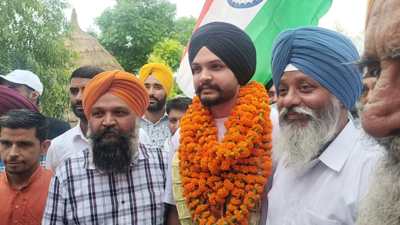
Sarabjot’s decision comes at a pivotal moment in his career. Despite familial pressure to accept the stable government job, the young marksman remains resolute in his commitment to the sport that brought him international recognition. The Deputy Director role, often regarded as a highly sought-after position within the state's sports administration, would have provided Sarabjot with a secure future and substantial influence in shaping Haryana's sports policies. However, Sarabjot has opted to put his athletic ambitions above immediate job security, a choice that has sparked widespread admiration among his peers and sports enthusiasts.
At the Paris Olympics, Sarabjot excelled in the 10m air pistol mixed team event, securing a bronze medal. This achievement not only added to India's Olympic tally but also elevated Sarabjot's status as one of the country’s top shooting talents. The Olympic success earned him a hero's welcome in his hometown of Dheen village, located in Haryana's Ambala district. Local residents and fans gathered in large numbers to celebrate their champion, who had brought pride to the village on the global stage.
Sarabjot’s refusal of the Deputy Director position, however, highlights the challenges faced by athletes who must balance their passion for sports with societal expectations of financial stability and professional security. For many, a government job, especially one as prestigious as the one offered to Sarabjot, represents a dream opportunity. Yet, for Sarabjot, the pursuit of excellence in shooting remains paramount. His decision is a clear message that he is not ready to hang up his boots just yet, and that he sees more potential for growth and success in his sporting career.
The young shooter’s determination to stay focused on his training and competitions is in line with his broader ambitions. Sarabjot has previously expressed his desire to further establish himself as a dominant figure in international shooting events. By declining the government role, he intends to dedicate more time to refining his skills, participating in global competitions, and possibly securing even higher accolades in the years to come.
Sarabjot’s journey in the world of shooting has been marked by numerous achievements, but the decision to turn down a government job in favor of his sport might be one of the most significant yet. This move could serve as an inspiration for other athletes who face similar crossroads in their careers, encouraging them to prioritize their passions and long-term goals over immediate benefits.
As Sarabjot continues his training, all eyes will be on him to see how he leverages this period to further his achievements in shooting. His story is not just one of athletic prowess but also of the courage to make unconventional choices in pursuit of greatness. Whether Sarabjot’s decision will lead to further success in his shooting career remains to be seen, but it undoubtedly sets a precedent for future athletes in India.
